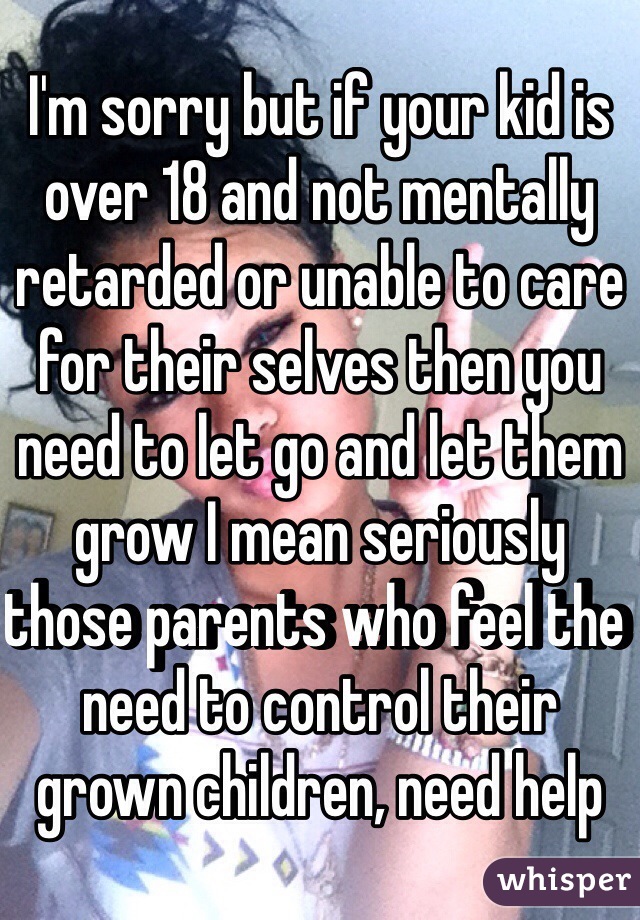Last Updated on October 13, 2022
The age of 18 is typically when young adults are considered to be in control of their lives. They can vote, join the military, and enter into legal contracts. However, some parents try to hold on to too much control even after their children have become adults.
This can often lead to conflict between parent and child. So, can your parents really control you at 18?
The moment you turn 18, you are legally an adult in the eyes of the law. That means your parents can no longer control you or make decisions on your behalf. However, that doesn’t mean they can’t still try!
Some parents may try to control their children even after they turn 18 by threatening to cut them off financially or telling them they need to live at home. Others may try to micromanage every aspect of their child’s life, from who they date to what job they take. It can be difficult to deal with controlling parents, especially if you still rely on them for financial support.
But it is important to remember that you are now an adult and have the right to make your own choices. If your parents are trying to control you, have a calm and honest conversation with them about why it isn’t okay and set boundaries accordingly.

Credit: whisper.sh
Can Your Parents Still Control You After 18?
The law says that once you turn 18, you are an adult and therefore have full control over your life. This includes your parents no longer being able to tell you what to do or make decisions on your behalf. However, in practice, things are often not so clear cut.
For example, if you live at home with your parents and they provide financial support for you, then they may still have some influence over what you do. If they are paying for your education or helping to support you financially, then they may want to have a say in how you spend your time and what kind of lifestyle you lead. Similarly, if you rely on your parents for emotional support or advice, then they may still feel like they need to be involved in your life even after you turn 18.
In general, though, once you become an adult the law says that it is up to YOU to make decisions about your life and nobody else can tell you what to do.
How Do I Deal With a Controlling Parent at 18?
It can be difficult to deal with a controlling parent at any age. But, it can be especially challenging when you’re 18 and trying to assert your independence. If your parent is overly controlling, it may feel like they are constantly putting restrictions on what you can do and micromanaging your life.
This can make it hard to live up to their expectations and can also cause tension in your relationship. Here are some tips for dealing with a controlling parent: 1. Communicate openly and honestly.
If you’re feeling controlled or restricted by your parent, sit down with them and have an honest conversation. Let them know how you’re feeling and why you think their behavior is problematic. Be respectful during the conversation, but firm in expressing your needs.
2. Set boundaries. It’s important that you set boundaries with a controlling parent so that they know what behaviors are acceptable and which ones are not. If they cross a boundary, be prepared to enforce the consequences that you’ve established (e.g., no phone privileges for a week).
By setting clear boundaries, you’ll help yourself feel more in control of the situation.
Do You Have to Do What Your Parents Say When Your 18?
It’s a common misconception that once you turn 18, you are free from your parents’ rules and can do whatever you want. However, this is not necessarily true. While 18 does mark the legal transition into adulthood, in many cases, young adults are still under the care of their parents and are subject to their rules.
Of course, every family is different and some parents may be more lenient than others when it comes to enforcing rules on their adult children. Ultimately, it depends on the relationship between parent and child as well as the specific circumstances involved. For example, if you are still living at home and relying on your parents for financial support, they may have more control over what you do than if you were living independently.
If you find yourself in a situation where you disagree with your parents about something important, it’s important to communicate openly and respectfully. Try to come to an agreement that works for everyone involved. Remember that even though you’re an adult now, your parents likely only want what’s best for you – so try to see things from their perspective as well.
What Age Do Your Parents Have No Control Over You?
The age at which your parents have no legal control over you varies from country to country. In the United States, for example, the age of majority is 18. This means that once you turn 18, your parents can no longer make decisions on your behalf or tell you what to do.
You are now considered an adult and are legally responsible for yourself. Of course, this doesn’t mean that your relationship with your parents suddenly ends. Many people continue to rely on their parents for emotional support even after they become adults.
And in some cases, parents may still be financially responsible for their children even after they turn 18. But overall, once you reach the age of majority, you are free to live your life as you see fit without interference from your parents.
10 Signs Your Parents Are Manipulative
Can My Parents Call the Cops If I Leave at 18
The simple answer is no, your parents cannot call the police if you leave home at 18. In most states, once you become an adult, your parents have no legal control over you and cannot force you to do anything. However, there may be some exceptions to this rule.
For example, if you are still in high school or owe money to your parents, they may be able to compel you to return home. But generally speaking, once you turn 18, your parents can no longer tell you what to do.
Conclusion
At 18, you are legally an adult in the eyes of the law. This means that your parents can no longer control you or make decisions for you. However, they may still try to do so out of habit or because they think it’s best for you.
If this is happening, it’s important to have a discussion with them about why you are now an adult and how things will be different from now on.

